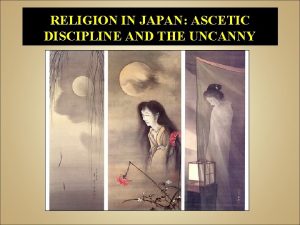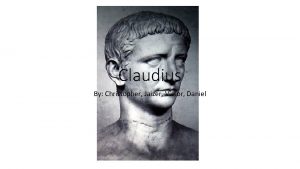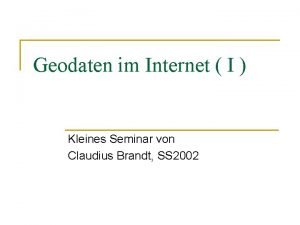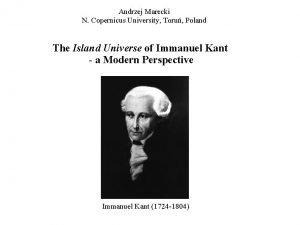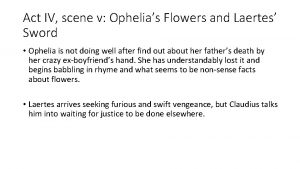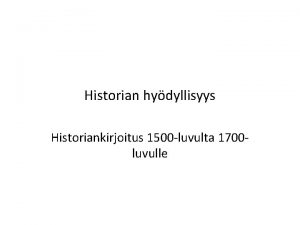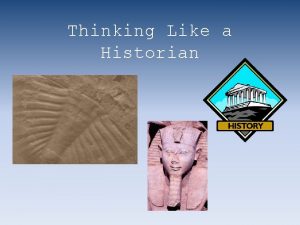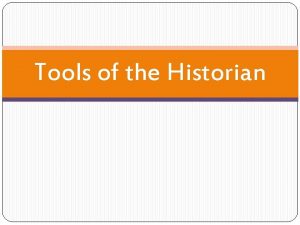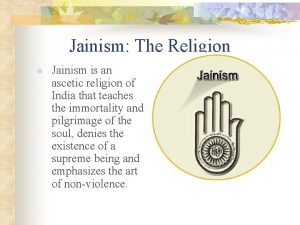66 AD Early Ascetic Community Historian Claudius Philo














- Slides: 14


66 AD: Early Ascetic Community: Historian Claudius Philo reports to St. Peter in Rome: “The best men [and women] in each region set out as colonists for a highly suitable spot, regarding it as the homeland of the Therapeutae. It is situated above Lake Mareotis on a low hill, very convenient in view of its security and the mildness of the climate. In every house there is a holy chamber called a sanctuary or ‘monastery’ where they celebrate in seclusion the mysteries of the sanctified life, bringing in nothing - drink, food, or anything else required for bodily needs - but laws and inspired oracles spoken by prophets, hymns, and everything else by which knowledge and true religion are increased and perfected…The whole period from dawn to dusk is given up to spiritual discipline. They read sacred scriptures, and study their ancestral wisdom philosophically, allegorizing it, since they regard the literal sense as symbolic of a hidden reality revealed in figures. They possess also short works by early writers, the founders of their sect, who left many specimens of the allegorical method, which they take as their models, following the system on which their predecessors worked. Thus they not only practise contemplation but also compose hymns to God in all kinds of metres and melodies, setting them, as might be expected, to solemn measures. ”

70 AD: Seige of Jerusalem Revisited - 1, 100, 000 Jews killed by Roman legions. - 90, 000 under 17 sold into slavery. - remaining in irons to hard labor in Egypt. - Judea renamed “Palestinia”. - Sanhedrin’s civil power abolished.

70 AD: Developments within the Church - churches in virtually every important city. - diakonoi, episkopoi & presbyteroi widespread. - Divine Liturgy in 2 parts: reading of Scripture and partaking of Eucharist. - Catechumens (3 years) attend only 1 st part. - Bishops distribute blessed bread to outlying churches, stressing unity.

~70 AD: Heresy of Docetism - Origin unknown. - Attempt to make Christian teaching more acceptable to paganism. - Jesus’ physical body & the crucifixion were illusions. Jesus was a phantom. - Ignatius, Irenaeus & Tertullian wrote against. - Died out in 1 st millenium.

79 AD: Titus succedes his father, Vespasian, and builds the Colliseum 81 AD: Domitian succedes brother Titus - rebuilt Rome, expanded the empire into England & Scotland & restored the temple of Jupiter and gave special homage to the goddess Minerva - required homage to himself and called himself “Lord” - persecuted Christians and Jews; confiscated their property - “Since Jews worship an invisible god they are atheists. ” - murdered in 96 AD

90: Growing Heresy of Gnosticism - Now the major heretical threat to Christianity. - Only some are capable of understanding the secret teachings of reality. These elect are spirit selves from the hidden world of light and knowledge, trapped in the material cosmos of darkness and ignorance, but destined to be restored. - 2 deities, a hidden spiritual god known only to the enlightened, a lesser evil god who made the world. - Matter, flesh and world are evil; spirit is good. - Sparks of the divine were entrapped in physical bodies. Salvation is the liberation of the divine spark from its imprisonment.

98 -117: Emperor Trajan - Expanded the Empire beyond the Danube, into Armenia and further into Egypt. - “Leave Christians alone unless they are openly practicing Christianity. ” - BUT, he did persecute Christians. - Became known as the ‘virtuous pagan’. - Enjoyed and promoted gladiator demonstrations and animals killing criminals and Christians in the Colliseum.

100: Developments in the Church - Copies of the Gospels and the Pauline letters were in wide circulation. - Churches began to develop creeds (L. ‘credo’ = I believe).

Clement of Rome (d. 99 AD): - a student of the Apostle Peter and consecrated as 2 nd Bishop of Rome by him. - letter to Corinthian church (80 AD) one of the earliest surviving documents outside the Scriptures. Affirmed apostolic authority. - banished by Trajan - one of the two most important early fathers of the Church, according to historian Archpriest John Morris

Matthew 18: 1 -6


The Creed of Saint Ignatius of Antioch “Turn a deaf ear to any speaker who avoids mention of Jesus Christ, who was of David’s line, born of Mary, who was truly born, ate and drank, was truly persecuted under Pontius Pilate, truly was crucified and died while those in heaven, on earth, and under the earth beheld it; who was also truly raised from the dead, the Father having raised Him who in like manner will raise us also who believe in Him. His Father, I say, will raise us in Christ Jesus, apart from whom we have not true life. ”

Ignatius of Antioch, the God-Bearer (107 AD): To laity: 1. Be united, of one purpose, with clergy and bishop. 2. Respect deacons as you do Christ, the bishop as a copy of the Father, and priests as the Council of God. 3. It is absurd to talk of Jesus Christ and practice Judaism. 4. Come together, all of you, with an undivided heart. 5. (for non-Christians) Let us be found their brothers in our forebearance. 6, For when you come together the powers of Satan are destroyed. To bishops: 7. Lift up all men, as the Lord lifts you, put up with all in love. 8. If you have good desciples, it is no credit to you; instead, bring the more troublesome into subjection with gentleness. 9. Stand firm as a hammered anvil. 10. Nothing is to be done without your approval, and you must do nothing without God. 11. In the name of Jesus Christ, command my brothers to love their wives as the Lord loves the Church. Of himself: 12. Let me be food for the wild beasts, through which I can attain God.
 Shinto sects diagram
Shinto sects diagram Philia and sophia
Philia and sophia Philo affiliate paraphernalia
Philo affiliate paraphernalia Claudius downfall
Claudius downfall Claudius keizer
Claudius keizer Claudius morgan
Claudius morgan Claudius ptolemy astronomy contributions
Claudius ptolemy astronomy contributions Claudius brandt
Claudius brandt Ptolemäus
Ptolemäus Hamlet act 4
Hamlet act 4 Julius claudius dinasztia
Julius claudius dinasztia Hamlet scene 3 act 3 summary
Hamlet scene 3 act 3 summary Michael claudius
Michael claudius Ophelia monologue flowers
Ophelia monologue flowers Thomas claudius huber
Thomas claudius huber
